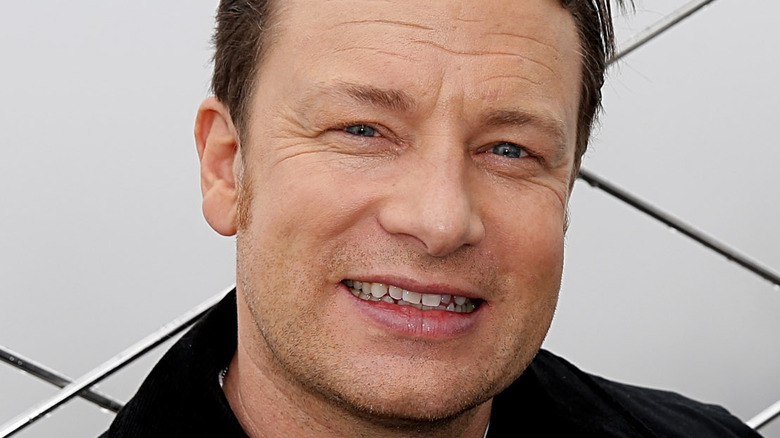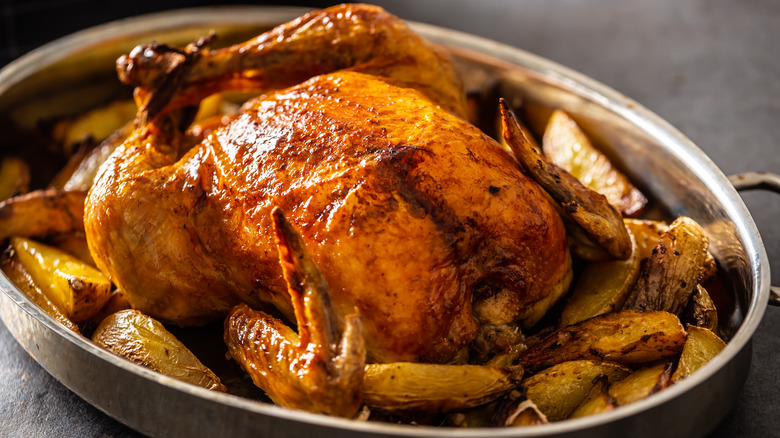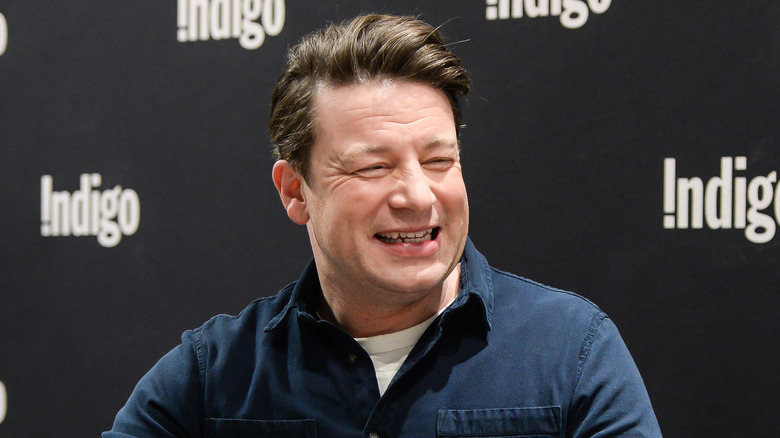Why Jamie Oliver Just Hired A Special Team To Vet His Recipes
If you've paid attention to pop culture in the past decade, you've probably noticed that political correctness is on the rise. According to NPR, usage of the term "politically correct" — which refers to the idea of being careful to make statements and draw conclusions that are inclusive of all groups and unlikely to offend anyone — has become way more common over the years, being cited in newspapers and magazines fewer than 250 times in 1989 but more than 10,000 times by 1994.
In recent years, a whole bevy of celebrities and prominent figures have been called on terms of political correctness, such as in 2008 when model Heidi Klum was called out for cultural appropriation when she dressed up as the Hindu goddess Kali for Halloween (via Vogue) and in 2020, when "Harry Potter" author J.K. Rowling was criticized for tweeting transphobic remarks, as explained by Glamour. Even food world personalities have been accused of political correctness, such as in 2019 when British chef Gordon Ramsay stirred up controversy after opening the London spot Lucky Cat, billed as "an authentic Asian Eating House" — without a single Asian chef in the kitchen (per CNN).
Fellow British chef and bestselling cookbook author Jamie Oliver has also come under fire — repeatedly — for cultural appropriation, having used terms and descriptors in his recipes that not all fans have been cool with. And that's why Oliver has hired a team of specialists to vet his cookbook language and make sure it's politically correct.
Oliver's "empire roast chicken" didn't fly with everyone
Chef, television personality, and cookbook author Jamie Oliver got his start back in 1999 with the premiere of his cooking show "The Naked Chef" and has since become a food world megacelebrity, having hosted additional TV series and written multiple cookbooks (via Britannica). Generally a popular culinary figure who has attracted acclaim from outlets like The Guardian for his efforts to reform school lunches, Oliver has nonetheless been the target of controversy when it comes to some of his recipes.
According to BBC, the flak started as far back as 2018, when Oliver marketed a microwavable side dish he called Punchy Jerk Rice, in reference to the famous Caribbean chicken marinade — but the rice contained hardly any traditional jerk ingredients, kicking off a Twitter firestorm. In 2020, Oliver posted a fried rice video to his YouTube channel, which was derided as inauthentic. And, more recently, Oliver admitted to the British Sunday Times magazine, a 2011 recipe for "empire roast chicken" — a bird cooked with Indian spices whose name references the British Empire's colonization of that country — has received blowback years later, with Oliver's team responding to the criticism by changing the recipe's online name to "spiced roast chicken" (via CNN).
In order to avoid making the same gaffes in future recipes, Oliver said in the same interview that he's hired "cultural appropriation specialists" to vet his content for any potentially offensive language.
Oliver wants to create "content that is culturally sensitive and inclusive"
According to CNN, chef and television personality Jamie Oliver is hoping to avoid future accusations of cultural appropriation by hiring specialists to examine his recipes and content to make sure the language around them is politically correct. "Food is all about sharing inspiration from around the world, and we're proud to work with some incredible experts to continue to learn about different cuisines and to help us deliver content that is culturally sensitive and inclusive," an Oliver spokesperson told the outlet.
In an interview with the Sunday Times, Oliver admitted that the 2011 "empire chicken" recipe and Channel 4 video where he cooks the dish would be considered offensive by today's standards, and that the new hirees will ensure no further mistakes of this type. "Your immediate reaction is to be defensive and say, 'For the love of God, really?' And then you go, 'Well, we don't want to offend anyone,'" Oliver explained (via CNN).


